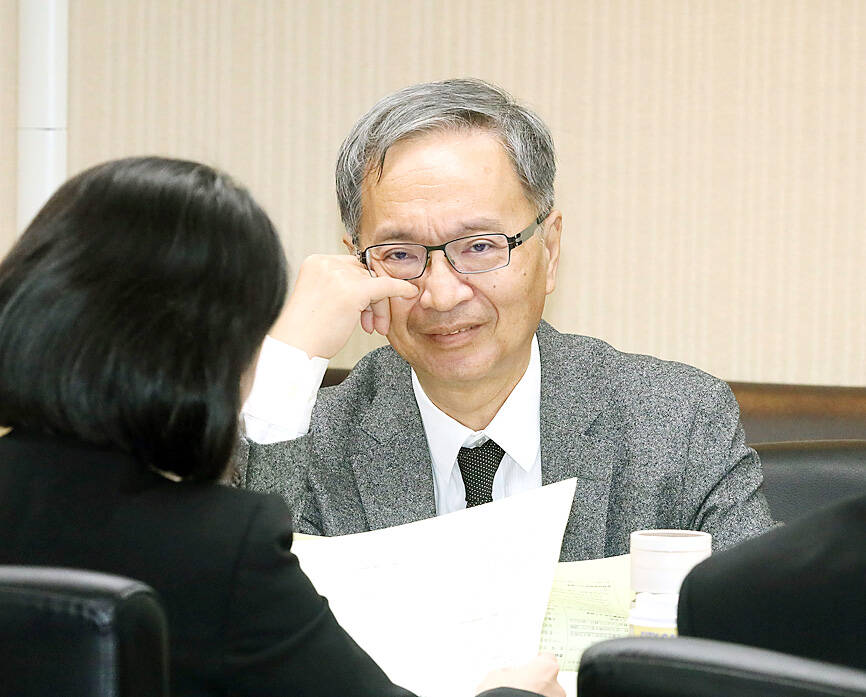Minister of Health and Welfare Hsueh Jui-yuan (薛瑞元) yesterday mooted an evaluation of a possible domestic violence disclosure scheme after a lawmaker suggested Taiwan needed its own version of “Clare’s law.”
The Ministry of Health and Welfare could conduct a trial to test the viability of adopting such regulations, Hsueh said, which would facilitate disclosing a person’s history of abusive behavior to those who might be at risk.
Hsueh made the comment during a joint session of the legislature’s Judiciary and Organic Laws and Statutes Committee and the Social Welfare and Environmental Hygiene Committee.

Photo: CNA
Democratic Progressive Party Legislator Su Chiao-hui (蘇巧慧) asked the ministry to clarify its position on allowing the government to disclose a person’s history of domestic abuse to a spouse or intimate partner.
The scheme is utilized in the Australia, Canada and the UK to apparent good effect, Su said.
Hsueh told lawmakers that the ministry is willing to try the scheme on a small scale to evaluate it, but would not back any immediate legislative action.
The ministry could not draw up new regulations or policies without first consulting other agencies, local governments and advocacy groups at public hearings, he said.
While it appears advantageous to allow people to check the domestic abuse history of their partners, the information might not be sufficient to get people who might be hurt to leave an abusive relationships, he said.
Moreover, the government would need time to devise a mechanism to enable disclosures if a trial showed the plan to be effective, Hsueh said.
Su agreed to withdraw parts of proposed amendments to the Domestic Violence Prevention Act (家庭暴力防治法) and passed a resolution calling on the ministry to conduct a trial of domestic abuse disclosures.
Reported incidents of domestic abuse have increased in Taiwan for the past 12 years, which suggests additional measures are needed, the resolution said.
A Taiwanese version of Clare’s law might help prevent serial abusers from finding new partners to victimize, it said, adding that the ministry should investigate why such cases have increased.
The committees approved amendments to the act to deal with videos with sexual content, and images created or disseminated without consent, as well as changes to restraining orders.
The proposed changes would ban the replication, distribution, display and any other action to disseminate such videos and images.
Social media platforms, app companies and Internet service providers would be made responsible for removing sexual videos and images taken or disseminated without consent, the proposed amendments say.
Commercial entities would be required to keep data from accounts that post such material for 180 days to facilitate investigations, the draft changes say.
Prosecutors would be able to request extensions or modifications to a restraining order without canceling the existing restraining order, as they are currently required to do, the proposed amendments say.
Courts would not need to dismiss a restraining order when considering requests to extend or amend it, as is currently required, they say.

‘DENIAL DEFENSE’: The US would increase its military presence with uncrewed ships, and submarines, while boosting defense in the Indo-Pacific, a Pete Hegseth memo said The US is reorienting its military strategy to focus primarily on deterring a potential Chinese invasion of Taiwan, a memo signed by US Secretary of Defense Pete Hegseth showed. The memo also called on Taiwan to increase its defense spending. The document, known as the “Interim National Defense Strategic Guidance,” was distributed this month and detailed the national defense plans of US President Donald Trump’s administration, an article in the Washington Post said on Saturday. It outlines how the US can prepare for a potential war with China and defend itself from threats in the “near abroad,” including Greenland and the Panama

A wild live dugong was found in Taiwan for the first time in 88 years, after it was accidentally caught by a fisher’s net on Tuesday in Yilan County’s Fenniaolin (粉鳥林). This is the first sighting of the species in Taiwan since 1937, having already been considered “extinct” in the country and considered as “vulnerable” by the International Union for Conservation of Nature. A fisher surnamed Chen (陳) went to Fenniaolin to collect the fish in his netting, but instead caught a 3m long, 500kg dugong. The fisher released the animal back into the wild, not realizing it was an endangered species at

The Chinese Nationalist Party (KMT) is maintaining close ties with Beijing, the Democratic Progressive Party (DPP) said yesterday, hours after a new round of Chinese military drills in the Taiwan Strait began. Political parties in a democracy have a responsibility to be loyal to the nation and defend its sovereignty, DPP spokesman Justin Wu (吳崢) told a news conference in Taipei. His comments came hours after Beijing announced via Chinese state media that the Chinese People’s Liberation Army’s Eastern Theater Command was holding large-scale drills simulating a multi-pronged attack on Taiwan. Contrary to the KMT’s claims that it is staunchly anti-communist, KMT Deputy

The High Prosecutors’ Office yesterday withdrew an appeal against the acquittal of a former bank manager 22 years after his death, marking Taiwan’s first instance of prosecutors rendering posthumous justice to a wrongfully convicted defendant. Chu Ching-en (諸慶恩) — formerly a manager at the Taipei branch of BNP Paribas — was in 1999 accused by Weng Mao-chung (翁茂鍾), then-president of Chia Her Industrial Co, of forging a request for a fixed deposit of US$10 million by I-Hwa Industrial Co, a subsidiary of Chia Her, which was used as collateral. Chu was ruled not guilty in the first trial, but was found guilty